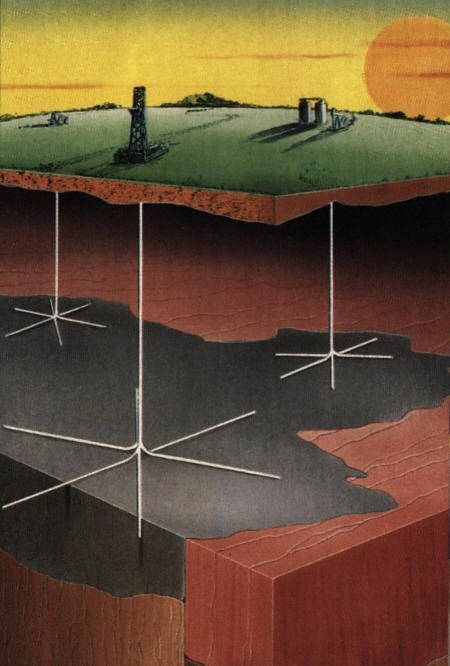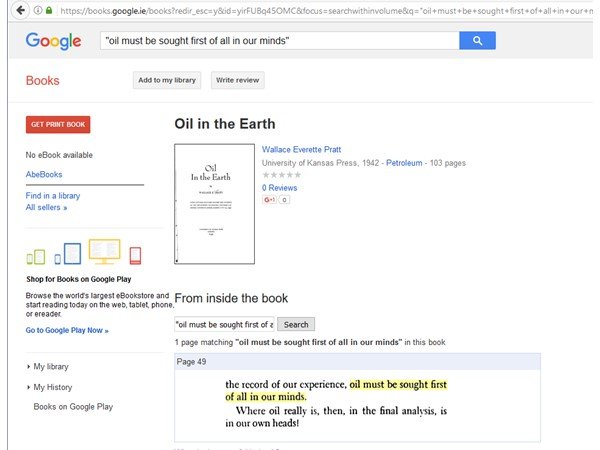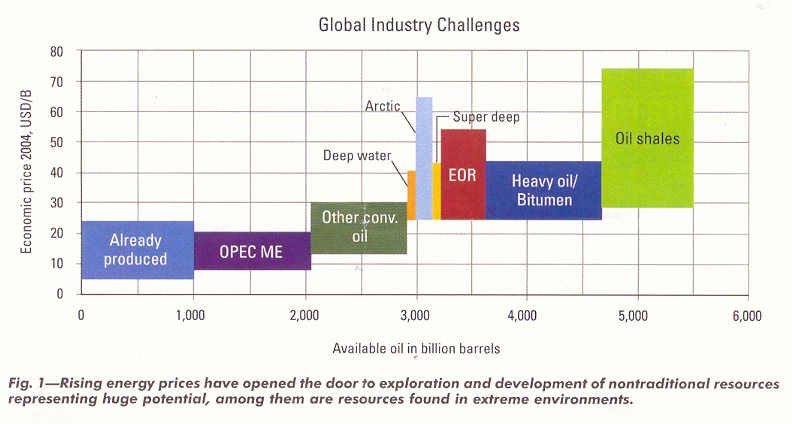|
|
| Blog |
 |
| Archive |
|
Q4/15 Q1/15 Q4/14
|
|
|
| Blog |
| To find an archived article, simply click on Index and scroll the subject titles, or do a Ctrl-F search |
TALLRITE BLOG
You can write to me at blog2-at-tallrite-dot-com |
|||||||||||||||||||||||||||||||||||||||||||||||||||||||||||||||||||||||||||||||||||||||||||||||||||||||||||||||||||||||||||||||||||||||||||||||||||||||
| February 2005 | |||||||||||||||||||||||||||||||||||||||||||||||||||||||||||||||||||||||||||||||||||||||||||||||||||||||||||||||||||||||||||||||||||||||||||||||||||||||
|
|||||||||||||||||||||||||||||||||||||||||||||||||||||||||||||||||||||||||||||||||||||||||||||||||||||||||||||||||||||||||||||||||||||||||||||||||||||||
ISSUE #94 - 13th February 2005 [250+397 = 647] |
|||||||||||||||||||||||||||||||||||||||||||||||||||||||||||||||||||||||||||||||||||||||||||||||||||||||||||||||||||||||||||||||||||||||||||||||||||||||
|
When Will the Oil
Run Out?
I am quite often asked this question by people who are unfamiliar with the oil industry, and it's not an easy one to answer, for reasons perhaps this post will make clear. According to published sources, the world has something like one trillion barrels of oil reserves (that is, 1012) and consumes around 84 million (106) barrels a day. Therefore we will run out of oil in 1,000,000 / 84 = 11,905 days = 32.6 years, ie in 2037 or thereabouts. That's within the lifetime of most of us (well, not me, obviously), so panic about a coming oil drought is entirely appropriate. Right ? Wrong. So wrong. For the equation assumes stasis, yet its two key components, reserves and consumption, are wildly dynamic and uncertain. Take CONSUMPTION. It is dictated by demand, but this in turn is driven
So if there is one thing you can be certain of between now and 2037, it is that consumption is not going to remain at 84 million bbl/day or any simple multiplicator of this. Then there's the RESERVES question, which is even trickier. Start by asking, what are reserves ? The reserves of a given oilfield are someone's best estimate of how much oil can be economically produced at today's prices and using today's technology. But reserves can't be measured like liquid in a swimming pool, because oil sits in countless tiny voids (eg the space between two grains of sand) within rock several kilometres downstairs and typically between a million and a billion cubic metres in size. So you have to estimate
On the last point, Recovery Factors for given oilfields range typically from 15% to 60%, with a global average of about 40%, meaning the other 60% doesn't appear in reserves estimates. The above is what you need to know, but all you can measure is a few metrics that will yield
So with this limited, spaced-out information, covering only a very small percentage of the rock, you nevertheless have to interpolate and extrapolate what it means for all of the rock. It is not hard to see, therefore, that if two engineers get together to agree on a reserves estimate, they come up with at least three different solutions. And that's not even to talk about human factors, such as
But even all this is only part of the story. Technology is changing all the time in a manner that in effect continuously increases reserves, as new ways emerge
And don't forget the direct effect of oil price.
Published reserves of the world's oil represents the sum of millions of estimates that take into account all the above factors. They are performed every day all over the globe by hundreds of thousands of engineers and geologists, competent and incompetent, honest and flaky, checked and not checked. So when you see a figure like one trillion barrels of reserves, know that it is no more than a best estimate as of a certain moment in time, and certainly wrong, and that it's changing all the time. Know also that less conventional energy alternatives - wind, solar, hydrogen, tidal - are developing fast, their costs are dropping and before long they will be able to displace significant oil volumes (in the process making oil reserves last longer). Above all, know and trust that there is no limit to human ingenuity. Indeed it is said that oil is found not in the ground but in that unfathomable, inexhaustible resource that is the human brain**, prompted it must be said by the driving force of benign human greed that so fascinated the Scottish economist Adam Smith, spiritual father of capitalism. The limitless human mind will always ensure there is sufficient oil to meet humankind's needs until well after our grandchildren have died of old age. And then there's politics and oil. Ahh, but that's a story for another day.
Late Note: Later Note (29th February 2008) Who would have thought
it?
These fields alone would keep the whole world going for 1½ years! That “limitless human mind” is still working its magic. Every cloud has a silver lining. The chart below chart illustrates how the monstrously high oil prices of mid-2008 (approaching $150/bbl) can liberate vast quantities of additional untapped oil, to be measured in the trillions of barrels. All the oil ever produced to date amounts to just one trillion barrels. It comes from a paper entitled “A Systematic Approach to Hostile Environments”, by Ashok Belani, Schlumberger's Chief Technology Officer and Steve Orr, its President of Artificial Lift. The paper appears in the July 2008 issue of the prestigious Journal of Petroleum Technology, July 2008.
Later Note (28 Jan 2010)
IHS Cambridge Energy Research Associates is a leading
advisor
It is headed by Daniel Yeargin, author of
The Prize,
In November 2009 IHS-CERA published a 16-page
report entitled
From reviewing
24,000 fields and discoveries
across the world,
Moreover, once reached the peak will
not be followed by a precipitous drop-off, The oil industry undoubtedly will face
major challenges as it finds new oil
Nevertheless, once again the apocalyptic doom-mongers
They fail to take account of
global economic conditions, geopolitics,
Well, Flight International magazine has now run the story, though it concentrates solely on what transpired within the Airbus A300 B4, to the exclusion of other angles. Nonetheless, its tale of three skilled crewmembers battling for 25 nail-biting minutes to save their aircraft and their own lives is a rattling good yarn of derring-do, which someone should surely turn into a movie. Since the article is subscription-only, I've transcripted it; just click on the flight-path thumbnail above. Especially if you're a film-maker. Blair Should Apologise to Edward It's been a season of apologies. First, Ireland's President Mary MacAleese showed how to apologise after she likened Ulster's protestants to Nazis, and Protestants then showed how to accept an apology gracefully. Last week, the Irish Times' humorous, right-leaning columnist Kevin Myers spent an entire column being “very, very sorry” for repeatedly referring in a previous column to the children of unmarried parents as bastards and causing a storm of outrage. Both columns are transcripted here. (It is an irony, incidentally, that it is seemingly perfectly acceptable to procreate “bastards” but not to describe them as “bastards”). And Britain's Tony Blair issued a formal apology to the so-called Guildford Four and Maguire Seven for the gross miscarriage of justice that resulted in their having been wrongly imprisoned for 14 years for IRA bombings in 1974 in Guilford and Woolwich that killed seven people. All three apologies were gracefully received. Now we hear that Prince Charles is going to marry, with the blessing of both the State and the divorce-forbidding Church of England which he will one day head. The lucky girl is his mistress of 35 years, some divorcée called Camilla Parker Bowles, who still carries the surname of her cuckolded, discarded ex-husband. She is also (whisper it quietly, a Catholic, albeit non-practicing and probably by now a convert to some other faith). Yet despite all this (and widespread hostility on the part of the British public), Charles will apparently remain eligible for kingship. He should be ineligible for two reasons.
So if His Toniness is going to give Charles his seal of approval, then on behalf of the State, he should also issue a posthumous apology to King Edward VIII and Wallis Simpson for the shabby way they were treated 68 years ago. Apologising is all the range and Mr Blair has shown he knows how to do it. Oh, and technically he needs an Act of Parliament to let a Catholic in the door. But he's hoping no-one (else) will notice. More on the love travails of Margaret, Charles and
Edward, Freedom Institute Blog Awards Obviously Wrong-Footed I go incommunicado in Hungary for ten days and what happens. I suddenly find that during my absence, the otherwise excellent Freedom Institute has the temerity to make no fewer than five awards for Irish Liberty Blogging and a further one for an international blog. This apparently is to foster high-quality online political commentary and discussion.
Now the fact that the Tallrite Blog is conspicuous by its inexplicable absence from this list in no way leads me down the path of green-eyed-monsterism. I am the last to begrudge anyone winning anything, least of all the above worthy bloggers, all of whom I heartily congratulate and now hold in the highest (grrr) esteem. However, who dreamed up such boring categories ? The contest would have been far livelier, and thus the winner(s) even more worthy, had it been judged on criteria that are undoubtedly much closer to surfers' hearts and minds. For example, whose blog
There. I knew you'd agree with me. Looking forward to a slightly more enlightened FI awards process in 2006.
For full details and photos, click here. Quote : “Three spooks and a lord” Gerry
Adams, president of Sinn Féin,
___________ Quote : “We had already taken the resolute action of pulling out of the (Nuclear Nonproliferation Treaty) and have manufactured nukes for self-defence to cope with the Bush administration's evermore undisguised policy to isolate and stifle the DPRK” The laughingly named Democratic People's Republic of
Korea |
|||||||||||||||||||||||||||||||||||||||||||||||||||||||||||||||||||||||||||||||||||||||||||||||||||||||||||||||||||||||||||||||||||||||||||||||||||||||
| See the Archive and Blogroll at top left and right, for your convenience | |||||||||||||||||||||||||||||||||||||||||||||||||||||||||||||||||||||||||||||||||||||||||||||||||||||||||||||||||||||||||||||||||||||||||||||||||||||||
| Return to Tallrite Blog | |||||||||||||||||||||||||||||||||||||||||||||||||||||||||||||||||||||||||||||||||||||||||||||||||||||||||||||||||||||||||||||||||||||||||||||||||||||||
Now, for a little [Light Relief]
|
Gift Idea |
||||||||||||||||||||||||||||||||||||||||||||||

Good to report that as at
FREED AT LAST, |
||||||||||||||||||||||||||||||||||||||||||||||
|
BLOGROLL
Atlantic Blog (defunct) Blog-Irish (defunct)
Jihad
Religion
Iona Institute
Leisure
Blog Directory
My Columns in the
|
||||||||||||||||||||||||||||||||||||||||||||||
|
What I've recently
But it's not
entirely honest in its subtle pro-Palestinian bias, and therefore needs
to be read in conjunction with an antidote, such as See detailed review +++++
BP's ambitious CEO John Browne expanded it through adventurous acquisitions, aggressive offshore exploration, and relentless cost-reduction that trumped everything else, even safety and long-term technical sustainability. Thus mistakes accumulated, leading to terrifying and deadly accidents in refineries, pipelines and offshore operations, and business disaster in Russia. The Macondo blowout was but an inevitable outcome of a BP culture that had become poisonous and incompetent. However the book is gravely compromised by a litany of over 40 technical and stupid errors that display the author's ignorance and carelessness. It would be better to wait for the second (properly edited) edition before buying. As for BP, only a wholesale rebuilding of a new, professional, ethical culture will prevent further such tragedies and the eventual destruction of a once mighty corporation with a long and generally honourable history. Note: I wrote
my own reports on Macondo +++++ A horrific account of:
More details on my blog here. +++++
After recounting a childhood of convention and simple pleasures in working-class Aberdeen, Mr Urquhart is conscripted within days of Chamberlain declaring war on Germany in 1939. From then until the Japanese are deservedly nuked into surrendering six years later, Mr Urquhart’s tale is one of first discomfort but then following the fall of Singapore of ever-increasing, unmitigated horror. After a wretched journey Eastward, he finds himself part of Singapore’s big but useless garrison. Taken prisoner when Singapore falls in 1941, he is, successively,
Chronically ill, distraught and traumatised on return to Aberdeen yet disdained by the British Army, he slowly reconstructs a life. Only in his late 80s is he able finally to recount his dreadful experiences in this unputdownable book. There are very few first-person eye-witness accounts of the the horrors of Japanese brutality during WW2. As such this book is an invaluable historical document. +++++
This is a rattling good tale of the web of corruption within which the American president and his cronies operate. It's written by blogger Michele Malkin who, because she's both a woman and half-Asian, is curiously immune to the charges of racism and sexism this book would provoke if written by a typical Republican WASP. With 75 page of notes to back up - in best blogger tradition - every shocking and in most cases money-grubbing allegation, she excoriates one Obama crony after another, starting with the incumbent himself and his equally tricky wife. Joe Biden, Rahm Emmanuel, Valerie Jarett, Tim Geithner, Lawrence Summers, Steven Rattner, both Clintons, Chris Dodd: they all star as crooks in this venomous but credible book. ACORN, Mr Obama's favourite community organising outfit, is also exposed for the crooked vote-rigging machine it is. +++++
It is really just a collation of amusing little tales about surprising human (and occasionally animal) behaviour and situations. For example:
The book has no real message other than don't be surprised how humans sometimes behave and try to look for simple rather than complex solutions. And with a final anecdote (monkeys, cash and sex), the book suddenly just stops dead in its tracks. Weird. ++++++
It's chapters are organised around provocative questions such as
It's central thesis is that economic development continues to be impeded in different countries for different historical reasons, even when the original rationale for those impediments no longer obtains. For instance:
The author writes in a very chatty, light-hearted matter which makes the book easy to digest. However it would benefit from a few charts to illustrate some of the many quantitative points put forward, as well as sub-chaptering every few pages to provide natural break-points for the reader. +++++
The author was a member of Britain's V Force, a forerunner of the SAS. Its remit was to harass Japanese lines of command, patrol their occupied territory, carryout sabotage and provide intelligence, with the overall objective of keeping the enemy out of India. Irwin is admirably yet brutally frank, in his descriptions of deathly battles with the Japs, his execution of a prisoner, dodging falling bags of rice dropped by the RAF, or collapsing in floods of tears through accumulated stress, fear and loneliness. He also provides some fascinating insights into the mentality of Japanese soldiery and why it failed against the flexibility and devolved authority of the British. The book amounts to a very human and exhilarating tale. Oh, and Irwin describes the death in 1943 of his colleague my uncle, Major PF Brennan. +++++ Other books here |
||||||||||||||||||||||||||||||||||||||||||||||
|
|
||||||||||||||||||||||||||||||||||||||||||||||
|
After
48
crackling, compelling, captivating games, the new World Champions are,
deservedly,
England get the Silver,
No-one can argue with
Over the competition, |
||||||||||||||||||||||||||||||||||||||||||||||
|
|
||||||||||||||||||||||||||||||||||||||||||||||





















